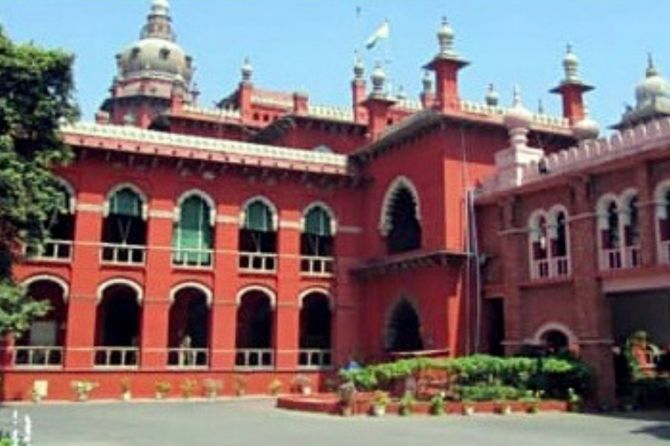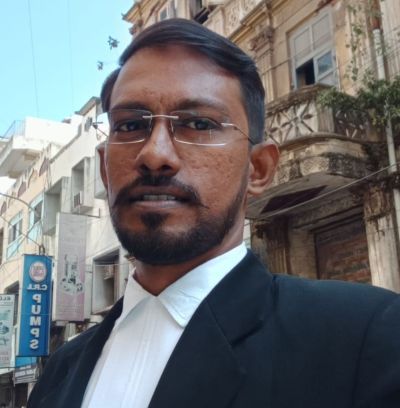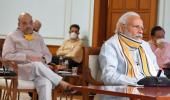'They might not have liked his judgments on IT rules, the Election Commission and Pondicherry.'

Chief Justice Sanjib Banerjee of the Madras high court has been transferred to the Meghalaya high court.
237 advocates of the Madras high court have urged that this transfer be reconsidered. These advocates feel that as Justice Banerjee was sworn in only in January 2021, there was no reason to transfer him and that too, to a court with only four judges. The Madras high court has 70 judges.
Advocate Jimraj Milton, who has been practicing in the Madras high court since 2009, tells Rediff.com's A Ganesh Nadar why the advocates feel that justice has not been done to Justice Banerjee.
Why is the Bar Association protesting Chief Justice Banerjee's transfer?
Justice Banerjee came here in January. Normally, a chief justice is elevated to the Supreme Court or transferred to another high court.
They (the Supreme Court collegium) decided on September 16 to transfer him and published it in November.
Even after taking a decision, they held it for a long time. No explanation has been given.
Last time, when Justice (Vijaya) Tahilramani was transferred to Meghalaya, she resigned in protest.
There is no difference between the Madras, Calcutta and Bombay high courts as they are chartered high courts. These are prestigious institutions. According to the Constitution all high courts are equal.
There are a lot of issues about elevating judges to chief justice and also transfers (of judges).
There are two bodies -- the government and the Supreme Court collegium -- for appointment of judges.
There is no transparency. Every time there are lots of questions.
What is the methodology? There is a lot of secrecy.
The Bar is questioning why this happened.
The President transfers with consultation of the Supreme Court collegium.
We are asking what consultations were done. What is the reasoning?
He (Justice Banerjee) is a judge who dispenses justice without fear.
Why is he being transferred? Most of the judges are working in their home state.
Only Parliament can remove a judge. The collegium can transfer.
We are asking for transparency.
Would you know if Chief Justice Banerjee himself is against his transfer?
We got information that he went to Delhi and met the collegium, but he has not talked to anyone.
It is not a voluntary transfer. They did not consult him.
The transfer was decided upon by the Supreme Court collegium which may have followed the necessary protocols in taking the decision.
There is no established protocol. The protocol is bargaining between the government and the collegium.
The Constitution gives the power (to appoint or transfer judges) to the government and the Chief Justice of India.
Now it is the top five judges of the Supreme Court.
A section of lawyers have backed Chief Justice Banerjee's transfer.
I think that is a very small section. Most of the Bar is opposing the transfer.
Can the Supreme Court collegium's decision be open to review merely because a section of lawyers are not in agreement with it?
It is always open for them to review their decision.
The institution is not working in a democratic way.
They have to consider the Bar as it is part of the institution. The Bar knows what is happening in court.

If the government listens to the Bar's objections and cancels the transfer, will it not dilute the power of the appointing committee and become an example for protests all over the country?
We are all here to develop the system. We are trying to improve the system -- to make it more transparent.
Justice Banerjee will retire in two years. If he is not elevated to the Supreme Court, he has to work for only two more years.
So why not let him continue as Madras high court chief justice till he retires?
It will not weaken, but strengthen the independence of the judiciary.
Is there a procedure prescribed for the collegium to review its decision?
There is no established procedure. If the government does not like a decision, it can send it back to the collegium to reconsider.
The collegium has the power to reconsider.
What recent judgments by Justice Banerjee do you think was not liked by the powers-that-be?
They might not have liked his judgments on IT rules, the Election Commission and Pondicherry.
Chief Minister M K Stalin's chairing a committee was challenged (he said it was a secular post).
We don't know what really irritated them.
To allege that Chief Justice Banerjee is being transferred because of some unfavourable verdicts is imputing motives to the collegium, is it not?
We are not putting any motive on the collegium. Whatever the Supreme Court collegium suggests, the government listens.
We feel the government is putting pressure to transfer him.

Justice Banerjee is not the first chief justice of the Madras high court whose transfer has kicked off a controversy.
Justice Tahilramani was another case where she resigned in protest because she was transferred to Meghalaya.
There are four judges there and here there are seventy.
What are the options available to Justice Banerjee?
He has to go to Meghalaya. He has no other option.
What should be done to avoid such controversies in the future?
In government service there is a clear protocol for appointment, elevation and transfer.
In the judiciary the major issue is transparency, appointing efficient persons, following social justice and represent all communities.
These are the three important things. They have to devise a protocol that includes these three.
Feature Presentation: Aslam Hunani/Rediff.com










